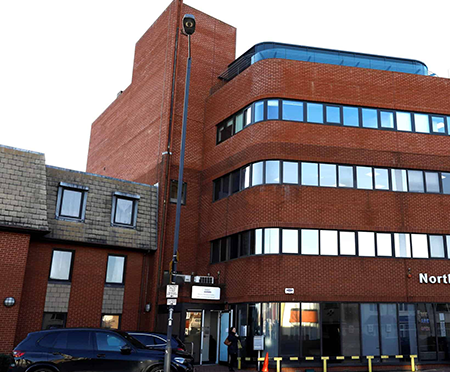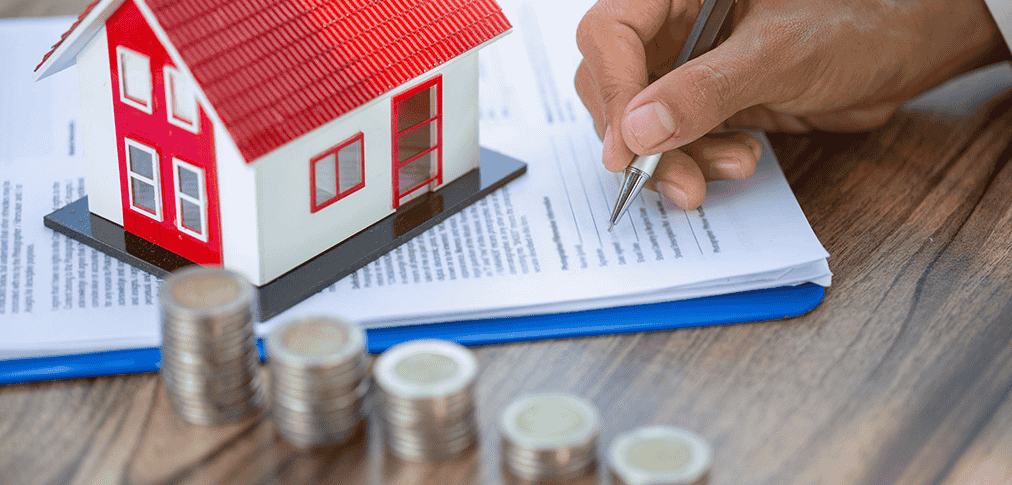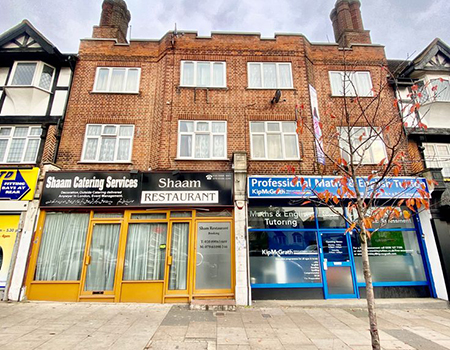Whether you're a first time buyer or buying a new property, if you’re considering buying a home situated close to businesses, shops or an industrial area, you may find it tricky to get a competitive mortgage. Some lenders take a cautious approach when it comes to offering mortgages on these types of properties.
The good news is that mortgage options are available. This guide will explore the ins and outs of getting a mortgage next to a commercial business.
The Topics Covered in this Article Are Listed Below:
- Can I Mortgage a Residential Property Next to a Business
- What Are the Advantages of Getting a Mortgage on a Home Adjacent to Commercial Properties?
- What Are the Downsides to Buying a Home in a Commercial Area?
- Why Is It Difficult to Get a Mortgage on a Property in a Business Zone?
- What Are the Lending Criteria for Flats Next to Businesses?
- Where Can I Get a Mortgage for a Property Next to a Business?
- What Size Deposit Do I Need to Mortgage a House Next to Business Premises?
- Do I Need a Bigger Deposit if My Circumstances or Finances Are More Complex?
- Why Might Some Lenders Reject a Mortgage Application with Bad Credit?
- Can I Get a Buy-to-Let Mortgage for a Flat Above a Business?
- Does It Make a Difference if I Buy a Leasehold Flat and the Business Owner Next Door is the Freeholder?
- Is It Possible to Get a Mortgage for a Flat Above a Shop?
- Can I Get a Mortgage for a Flat Above a Restaurant?
- Can I Get a Mortgage for a Flat Above a Supermarket?
- What Size Mortgage Can I Get on a Flat Above a Business?
- Can I Get a Mortgage for the Adjacent Commercial Premises?
- How to Get a Mortgage for a Home Next to a Commercial Property
- Mortgages Next to Commercial Property: Get in Touch
Can I Mortgage a Residential Property Next to a Business?
Many lenders will provide mortgages for residential properties situated near a commercial business. Let's first look at the pros and cons to consider when buying a property in these circumstances.
What Are the Advantages of Getting a Mortgage on a Home Adjacent to Commercial Properties?
- Living in a central location means you'll have the convenience of being close to a range of facilities such as public transport, restaurants and shops
- Residential properties near businesses tend to be cheaper than those in entirely residential locations
- Your neighbours could be the owners of the business. With an invested interest in running the business long term, they’re likely to be quiet and respectful neighbours
- Houses and flats in desirable locations within city centres can often provide high rental returns
- Many businesses, such as offices, are unlikely to be in use overnight or at weekends, reducing the impact of traffic and noise
What Are the Downsides to Buying a Home in a Commercial Area?
- It can be challenging to sell homes in commercial areas which might have more volatile market values
- Factories and food businesses such as restaurants can be noisy and release strong odours
- Commercial properties often have large advertising boards, large commercial waste bins or very bright lighting that can be disruptive to neighbouring properties
- Deliveries can happen very early in the morning and/or very late at night
Why Is It Difficult to Get a Mortgage on a Property in a Business Zone?

Many lenders view residential properties near businesses to be higher risk. Excessive noise and smells can make the property much harder to sell in the future, which can put off a lender. They want reassurances that they'll be able to recoup their losses should they have to repossess the property. Nonetheless, this doesn’t mean all lenders will decline an application on a property in a business zone. It all depends on their criteria and what factors they take into account. For example, many homes in popular parts of London are close to, or even right next door or over to, businesses and they often have great resale value due to the area.
What Are the Lending Criteria for Flats Next to Businesses?
Lenders will have a valuation done on the property and will look at your individual circumstances when considering your mortgage application.
For example, they’ll consider:
- Your age
- Your credit history
- Your income
- What type of property do you want a mortgage for
- What commercial premises are nearby
Your lender will want to assess the type of commercial premises the property you're looking to buy is in the vicinity of. Lenders categorise commercial premises by risk. The lowest is Class A1, and the highest category, with greater risk and requiring a more complex mortgage application, is Class A5.
- Class A1: Shops and retailers
- Class A2: Businesses and professional services
- Class A3: Food and drink outlets
- Class A4: Bars and pubs
- Class A5: Hot food and takeaways
Where Can I Get a Mortgage for a Property Next to a Business?
Several lenders, including Halifax and NatWest, are willing to offer mortgages for flats above shops and houses adjacent to, or close to, businesses. However, these lenders require the property to meet certain criteria.
For example:
- Self-contained and separate from adjoining businesses
- Have suitable access
- Have a separate title deed from the adjacent business premises
It’s best to speak to a mortgage broker like John Charcol if you’re looking to buy a property next to a business, especially if the situation is particularly complex. We know which lenders you’ll be eligible to apply to and what criteria they have. This means we’ll be able to find you the best deal on the market for your circumstances.
What Size Deposit Do I Need to Mortgage a House Next to Business Premises?
Most lenders will require you to put down a minimum deposit of 5% - 10% of the property's purchase price. This means the maximum LTV (loan-to-value) available is 90% - 95%.
Some lenders may ask for a bigger deposit if the property is next to or above a Class A5 business but this will depend on their criteria.
Do I Need a Bigger Deposit if My Circumstances or Finances Are More Complex?
You may need to provide a larger deposit depending on the lender and your circumstances. For instance, if you have a bad credit history, a lender may want to know what affected your rating. This will help the lender determine the likelihood of your ability to pay your monthly mortgage repayments. They may ask you to put down a larger deposit as per their criteria.
Why Might Some Lenders Reject a Mortgage Application with Bad Credit?
When a borrower has a bad credit history, there's a greater risk to the lender that the borrower won't meet their mortgage repayments. However, that doesn't mean that you won't be able to get a mortgage on a home near a commercial property.
If you do have a poor credit history, it's a good idea to spend a few months working on improving it before applying for a mortgage. Adverse lenders will consider mortgages even if you have a bad credit history, but they’ll likely charge at higher rates. An independent mortgage broker will be able to advise on which lenders are more likely to consider you for a mortgage.

Can I Get a Buy-to-Let Mortgage for a Flat Above a Business?
Buy-to-let mortgages are available for flats above businesses. Most lenders will require you to put down a deposit of at least 25% of the purchase price.
See our page on buy-to-let mortgages and our guide on mortgages for flats above shops for more information.
Does It Make a Difference if I Buy a Leasehold Flat and the Business Owner Next Door Is the Freeholder?
It's common for a flat next to a business to be a leasehold property, with the neighbouring business owner owning the freehold. This may mean that there's a fixed period to how long you can live in the property, usually from 125 years. At the end of this period, the property's ownership reverts to the leaseholder or freeholder.
If the business owner owns the freehold, you'll be required to pay them ground rent and service charges, alongside your mortgage. Whoever owns the freehold is responsible for repairs to the building and communal areas. They must also pay the building's insurance and be responsible for dealing with any anti-social neighbours, if necessary.
Is It Possible to Get a Mortgage for a Flat Above a Shop?
There’s a large number of lenders that will approve mortgages for flats above shops. This is because shops tend to come under the Class A1 category and are less likely to have any sort of impact on the flat.
Lenders are also more likely to offer a mortgage on a flat over a commercial property in central areas like London, where these properties are in extremely high demand, compared with small towns that have less demand.
It's best to use a mortgage broker if you want a mortgage for a flat above a shop as we can help you find the most competitive rates for your situation.
Can I Get a Mortgage for a Flat Above a Restaurant?

There are lenders that will consider mortgages for flats above restaurants. Whether a lender accepts an application will depend on their criteria, the class of the restaurant and the impact it could have on the flat.
Therefore, if the circumstances are right, you can get a mortgage on a flat above a chip shop, kebab house or your favourite takeaway. However, the lending market for these properties is fairly small as their Class A5 so you’ll have a limited choice of lenders and mortgage products. As a result, you may find that the rates offered are higher than average. An independent mortgage broker will be able to advise you on the best deal for your circumstances.
Can I Get a Mortgage for a Flat Above a Supermarket?
As long as your circumstances and the property itself meet the mortgage provider's lending criteria, you can get a mortgage for a flat over a supermarket. Specialist lenders that provide mortgages for flats above businesses will likely consider your application for a mortgage in much the same way as others.
What Size Mortgage Can I Get on a Flat Above a Business?
What size mortgage a lender will offer you will depend what you can afford. Most mortgage lenders set their own lending criteria, but lenders will usually base your maximum borrowing on 4.5x your income.
The maximum LTV for a mortgage on a flat above a business is typically 80% - 85%.
Can I Get a Mortgage for the Adjacent Commercial Premises?
If you're interested in buying the commercial premises and the adjacent residential property, you can consider applying for a commercial, mixed-use or semi-commercial mortgage. The application process for these mortgages is different from applying for a standard residential mortgage. You'll be required to provide proof of your business's net worth, income and expenditure, plus 3 years of financial records. Your lender may also ask to see a detailed business plan for the business you plan to run from the property.
How to Get a Mortgage for a Home Next to a Commercial Property
Speak to an Independent Mortgage Broker
Working with an independent mortgage broker with expertise in mortgages near commercial properties will greatly improve your application's chances of approval. At John Charcol, we have in-depth knowledge of the mortgage market and access to a wide range of lenders and mortgage products, which means we’ll be able to find you the best deal for your circumstances.
Understanding Your Requirements
Your adviser will help you find the best mortgages for your circumstances and the type of property you're looking to buy.
In addition to finding about your circumstances, we’ll ask you about:
- The position of the property and whether it's directly above the business or one or more floors above
- The type of business the property is adjacent to
- The business' opening hours
- Whether there's a shared entrance or other shared facilities
Finding the Right Lender and Mortgage
We’ll match you with a lender with criteria suitable for your circumstances. Most lenders will base their lending decisions on your age, income, credit history, employment status and the specifics of the particular property you’re looking to buy, but they each have different requirements which is why it’s important to know which lenders to approach.
As an independent mortgage broker we have access to many more mortgage deals than you’d be able to find on your own, so feel assured we’ll be able to help you find the best rate.
Managing Your Application
We’ll manage the entire process for you – from your first conversation with us right up to completion. Your adviser will source you a product, liaise with the lender, submit your application and more.
Mortgages Next to Commercial Property: Get in Touch
If you want to buy a residential property near, above or adjacent to commercial properties, contact John Charcol. Our expert advisers can help you find the right mortgage for your circumstances. Contact our team today on 0330 433 2927 or submit an online enquiry.
First-Time Buyer Mortgages
Discover the best first time buyer mortgage rates available and the latest advice from John Charcol: mortgage broker for first time buyers.
Applying for a Mortgage
Applying for a mortgage couldn’t be simpler with our easy and simple guide from application to accepting your offer.
How Much Can I Borrow?
This mortgage calculator examines your income and works out how much money a mortgage lender might provide you with
House Buying Mortgage Guide
Are you looking to buy your first home? Or perhaps want to move to a new area? Our step-by-step guide will tell you everything you need to know about buying a house.
Help to Buy Guide
Support from the government-backed Help to Buy initiative is available for first-time buyers and existing homeowners who are finding it difficult to move up the housing ladder.
House Mortgage Deposit
Saving a mortgage deposit for a house is definitely one of the biggest hurdles you face as a buyer. In our guide we explain how deposits work and ways you can save.
Mortgage Deposit Amounts
Learn all about the different mortgage deposit amount options, how they affect your mortgage, how they vary depending on what type of borrower you are & more.
Funding Home Improvements
There are a few ways to finance work on a house: get a home improvement loan, remortgage for home improvements, ask your lender for a further advance & more
Mortgage Glossary
On this page you’ll find our detailed mortgage terminology glossary. There’s a lot of jargon out there but we’re here to make it easy.

